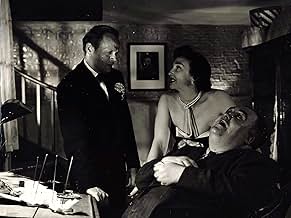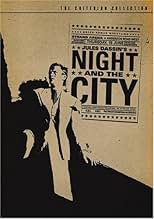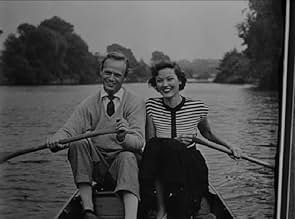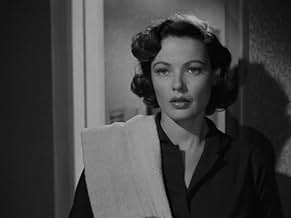IMDb रेटिंग
7.8/10
16 हज़ार
आपकी रेटिंग
अपनी भाषा में प्लॉट जोड़ेंA small-time grifter and nightclub tout takes advantage of some fortuitous circumstances and tries to become a big-time player as a wrestling promoter.A small-time grifter and nightclub tout takes advantage of some fortuitous circumstances and tries to become a big-time player as a wrestling promoter.A small-time grifter and nightclub tout takes advantage of some fortuitous circumstances and tries to become a big-time player as a wrestling promoter.
Ken Richmond
- Nikolas of Athens
- (as Ken. Richmond)
Paul Beradi
- Diner
- (बिना क्रेडिट के)
Derek Blomfield
- Young Policeman
- (बिना क्रेडिट के)
Clifford Buckton
- Policeman
- (बिना क्रेडिट के)
Ernest Butcher
- Bert
- (बिना क्रेडिट के)
Peter Butterworth
- Thug
- (बिना क्रेडिट के)
Naomi Chance
- Nightclub Hostess
- (बिना क्रेडिट के)
Edward Chapman
- Hoskins
- (बिना क्रेडिट के)
फ़ीचर्ड समीक्षाएं
The rise and fall of small-time hustler Harry Fabain is chronicled in this noir thriller by Director Jules Dassin.
This was Dassin's American swansong, completed just before being named by fellow director Ed Dmytryk before HUAK as a "communist," thus ending Dassin's American career.
He brought to "Night and the City" all the technique he acquired over years of quality movie making. Although born in Connecticut and raised and trained in the US, Dassin's work always had the look and feel of his European counterpart, Carol Reed.
The script here is a decent one with surprise turns, avoiding predictability. Franz Waxman's high pitched score adds excitement to the proceedings and Gene Tierney is a creditable second lead.
Yet it's Richard Widmark on whose shoulders the success of this film ultimately rests. It's not an easy role, as Fabian's character runs the gamut of emotional range as he struggles to wheel and deal his petty schemes amongst assorted lowlife types.
Widmark proves he's well up to the challenge, creating a strong portrait of a small time hood striving for positive payoffs through his callous cleverness.
It's a reminder of how talented and resourceful this actor is, and how he and Dassin meshed to create a film of impact.
Dassin, of course, went on to France after this to engage in a fabulous European period, while Widmark struggled to find scripts worthy of his formidable talents, which turned out to be few and far between.
This was Dassin's American swansong, completed just before being named by fellow director Ed Dmytryk before HUAK as a "communist," thus ending Dassin's American career.
He brought to "Night and the City" all the technique he acquired over years of quality movie making. Although born in Connecticut and raised and trained in the US, Dassin's work always had the look and feel of his European counterpart, Carol Reed.
The script here is a decent one with surprise turns, avoiding predictability. Franz Waxman's high pitched score adds excitement to the proceedings and Gene Tierney is a creditable second lead.
Yet it's Richard Widmark on whose shoulders the success of this film ultimately rests. It's not an easy role, as Fabian's character runs the gamut of emotional range as he struggles to wheel and deal his petty schemes amongst assorted lowlife types.
Widmark proves he's well up to the challenge, creating a strong portrait of a small time hood striving for positive payoffs through his callous cleverness.
It's a reminder of how talented and resourceful this actor is, and how he and Dassin meshed to create a film of impact.
Dassin, of course, went on to France after this to engage in a fabulous European period, while Widmark struggled to find scripts worthy of his formidable talents, which turned out to be few and far between.
"Night and the City" was the final film for Jules Dassin in the U.S. before being blacklisted. He eventually moved to France but didn't make another film until 1955. Though he is best remembered for the films he did with his wife, Melina Mercouri, this is one of his great movies, a very gritty film noir with London as its background.
Richard Widmark plays Harry Fabian, a low-life con man who makes money as a tout for a club, i.e., he seeks out male tourists and gets them to spend their money there. The club is owned by Phil Nosseross (Francis L. Sullivan) and his wife Helen, who hates her husband and wants to start her own business. Working there is Fabian's girlfriend (Gene Tierney) who loves him in spite of the fact that he's constantly borrowing or stealing money from her.
Harry hits on a scheme to break into wrestling promotion in London. Unfortunately, Kristo (Herbert Lom) has it sewn up. Though his father (Stanislaus Zbyszko, a real-life wrestler) was a great wrestling champion doing Greco-Roman boxing, Kristo does not promote it. This has actually caused a rift between father and son, and Harry moves right in. With the elder Kristo on his side, Harry gets his chance to promote Greco-Roman wrestling. He gets the needed money by promising Helen that he will get her a license to open her business, though the building supposedly can't be licensed for another year. The results of Harry's project lead to tragedy as he brings everybody down with him.
Filmed in black and white only adds to the grittiness of "Night and the City" as Harry runs through London. The film moves as swiftly as he does, leading to the inevitable but exciting climax.
This was a powerhouse role for Richard Widmark, who is a slimy, desperate, and fast-talking Harry. The problem with Harry is, he's really not that good of a con man. He's sloppy. He can get guys into the club but that's about it. He rubs the wrong people the wrong way, and he makes everyone angry until finally, he's a complete untouchable as Kristo chases after him. Widmark gives us a perfect portrait. Tierney is in the film only at the request of Zanuck, who wanted to distract her from her personal problems; she has a surprisingly small role. Herbert Lom is fantastic as Kristo. Stanislaus Zbyszko, whom Dassin sought out, gives a poignant performance as Gregorius the Great. The wonderfully talented Googie Withers is great as the cold and sophisticated Helen. You totally believes she loathes her husband. And Sullivan's Nesseros is easy to loathe as a wealthy worm who plays both ends against the middle to destroy Fabian. They all end up destroying themselves.
Apparently this film did not get appropriate distribution or something, because it's a great film, now out on DVD, and very few people know it. Hopefully, like "Nightmare Alley," another film that was ill-served by Hollywood, it will continue to gain in cult status. It deserves to be seen.
Richard Widmark plays Harry Fabian, a low-life con man who makes money as a tout for a club, i.e., he seeks out male tourists and gets them to spend their money there. The club is owned by Phil Nosseross (Francis L. Sullivan) and his wife Helen, who hates her husband and wants to start her own business. Working there is Fabian's girlfriend (Gene Tierney) who loves him in spite of the fact that he's constantly borrowing or stealing money from her.
Harry hits on a scheme to break into wrestling promotion in London. Unfortunately, Kristo (Herbert Lom) has it sewn up. Though his father (Stanislaus Zbyszko, a real-life wrestler) was a great wrestling champion doing Greco-Roman boxing, Kristo does not promote it. This has actually caused a rift between father and son, and Harry moves right in. With the elder Kristo on his side, Harry gets his chance to promote Greco-Roman wrestling. He gets the needed money by promising Helen that he will get her a license to open her business, though the building supposedly can't be licensed for another year. The results of Harry's project lead to tragedy as he brings everybody down with him.
Filmed in black and white only adds to the grittiness of "Night and the City" as Harry runs through London. The film moves as swiftly as he does, leading to the inevitable but exciting climax.
This was a powerhouse role for Richard Widmark, who is a slimy, desperate, and fast-talking Harry. The problem with Harry is, he's really not that good of a con man. He's sloppy. He can get guys into the club but that's about it. He rubs the wrong people the wrong way, and he makes everyone angry until finally, he's a complete untouchable as Kristo chases after him. Widmark gives us a perfect portrait. Tierney is in the film only at the request of Zanuck, who wanted to distract her from her personal problems; she has a surprisingly small role. Herbert Lom is fantastic as Kristo. Stanislaus Zbyszko, whom Dassin sought out, gives a poignant performance as Gregorius the Great. The wonderfully talented Googie Withers is great as the cold and sophisticated Helen. You totally believes she loathes her husband. And Sullivan's Nesseros is easy to loathe as a wealthy worm who plays both ends against the middle to destroy Fabian. They all end up destroying themselves.
Apparently this film did not get appropriate distribution or something, because it's a great film, now out on DVD, and very few people know it. Hopefully, like "Nightmare Alley," another film that was ill-served by Hollywood, it will continue to gain in cult status. It deserves to be seen.
In London, the swindler Harry Fabian (Richard Widmark) is an ambitious loser, frequently taking money from his girlfriend Mary Bristol (Gene Tierney). When he meets the famous Greco-Roman wrestler Gregorius the Great (Stanislaus Zbyszko) in the arena of his son and the wrestling lord Kristo (Herbert Lorn), he plans a scheme to become successful. He cheats Greorious, promising clean combats in his own arena, and the old man accepts the partnership. However, without money to promote the fight, he invites his boss and owner of a nightclub Phil Nosseross (Francis L. Sullivan) to be his partner, but is betrayed and his business fails ending in a tragedy.
"Night and the City" is a great film-noir, with many twists and another excellent performance of Richard Widmark. The story shows the underworld of London, with low-lives, hustlers, beggars, gamblers and other amoral characters through a magnificent black and white cinematography. The direction of Jules Dassin is sharp and the screenplay perfectly develops the characters and the story in an excellent pace. The Brazilian distributor Oregon Filmes / Fox has one of the best collections of movies labeled "Tesouros da Sétima Arte" ("Treasures of the Seventh Art"). Unfortunately, most of their DVDs shamefully have problems while playing the film, maybe because of the lack of quality of the laboratory they use. My vote is nine.
Title (Brazil): "Sombras do Mal" ("Shadows of Evil")
Note: On 10 October 2016, I saw this film again.
"Night and the City" is a great film-noir, with many twists and another excellent performance of Richard Widmark. The story shows the underworld of London, with low-lives, hustlers, beggars, gamblers and other amoral characters through a magnificent black and white cinematography. The direction of Jules Dassin is sharp and the screenplay perfectly develops the characters and the story in an excellent pace. The Brazilian distributor Oregon Filmes / Fox has one of the best collections of movies labeled "Tesouros da Sétima Arte" ("Treasures of the Seventh Art"). Unfortunately, most of their DVDs shamefully have problems while playing the film, maybe because of the lack of quality of the laboratory they use. My vote is nine.
Title (Brazil): "Sombras do Mal" ("Shadows of Evil")
Note: On 10 October 2016, I saw this film again.
Recently out on Criterion DVD, with a restored print, this is a very nice example of 1950s film noir, although when it was made the director, Jules Dassin, didn't even know there was a classification known as film noir. In fact, the DVD extras, which include a fairly recent interview with the aging Dassin is as captivating as is the movie itself. Back in the late 1940s when "blacklisting" was a reality, Dassin was essentially told, go to London quickly, make this movie quickly, it may be your last. He made "Night and the City" without ever reading the source material, the book, and the movie is apparently quite different. Two versions were made simultaneously, using the same source film, but with different musical composers and different film editors. The DVD extras contains excerpts to demonstrate some of the differences, including a drastically different ending.
Good movie, worth a viewing for the acting of underrated Richard Widmark who plays Harry Fabian, an American post-war hustler in London. Fabian had big ideas of half-baked schemes and always was hitting up a friend for a hundred quid here, 300 quid there, to finance his latest get rich quick scheme. In the extras we learn that Gene Tierney was requested for the part of Fabian's girl Mary Bristol, because she was in a bad way after a recent romantic breakup, and according to Dassin "was suicidal." This movie helped bring her back to a good state.
Googie Withers, an actress I had never heard of, is good as Helen Nosseross, married to the rich but disgusting Phil (Francis Sullivan) and just wanting to get a license for her own night spot and a chance to break away from her husband. She is forced to deal with Fabian, a decision that cost her dearly.
Perhaps the most interesting actor is Stanislaus Zbyszko, one time "world's strongest man" from Poland, in 1949 living in New Jersey. Even though he was unexperienced, he gives a super performance as an old retired wrestler Gregorius the Great, who was grooming his son for a wrestling career. Mike Mazurki plays his nemesis, The Strangler.
Although the story gets a bit complex in the various relationships, it simply distills into Fabian seeing an opportunity to contract Gregorius to feature a wrestling match that will allow Fabian, at least in his eyes, to "control" wrestling in London. But his various scams catch up with him and all does not turn out well, as is the case in a film noir.
Good movie, worth a viewing for the acting of underrated Richard Widmark who plays Harry Fabian, an American post-war hustler in London. Fabian had big ideas of half-baked schemes and always was hitting up a friend for a hundred quid here, 300 quid there, to finance his latest get rich quick scheme. In the extras we learn that Gene Tierney was requested for the part of Fabian's girl Mary Bristol, because she was in a bad way after a recent romantic breakup, and according to Dassin "was suicidal." This movie helped bring her back to a good state.
Googie Withers, an actress I had never heard of, is good as Helen Nosseross, married to the rich but disgusting Phil (Francis Sullivan) and just wanting to get a license for her own night spot and a chance to break away from her husband. She is forced to deal with Fabian, a decision that cost her dearly.
Perhaps the most interesting actor is Stanislaus Zbyszko, one time "world's strongest man" from Poland, in 1949 living in New Jersey. Even though he was unexperienced, he gives a super performance as an old retired wrestler Gregorius the Great, who was grooming his son for a wrestling career. Mike Mazurki plays his nemesis, The Strangler.
Although the story gets a bit complex in the various relationships, it simply distills into Fabian seeing an opportunity to contract Gregorius to feature a wrestling match that will allow Fabian, at least in his eyes, to "control" wrestling in London. But his various scams catch up with him and all does not turn out well, as is the case in a film noir.
This gritty film, exposing the world of small time crooks in London, is a real masterpiece of film noir. The director, Jules Dassin, has captured this dark, dirty world perfectly and the black and white cinematography is superb. Richard Widmark is as despicable here as he was as Tommy Udo in "Kiss of Death"...it is a coup of casting. Francis Sullivan as Phil is great as the nightclub owner for whom Widmark shills and Googie Withers, one of my favorites of British film, is awesome as the unfaithful wife. Gene Tierney is wasted as Widmark's girlfriend...she does not seem to have much to do. Other support players are strong and you get to see Herbert Lom without his toupee! This is one of the best in the film noir genre and the ending pulls no punches. This is not a happy, feel good film. Highly recommended.
क्या आपको पता है
- ट्रिवियाDirector Jules Dassin made the film while in the process of being blacklisted. Fox studio chief Darryl F. Zanuck told him it could possibly be the last film he'd ever direct, so he should shoot the most expensive scenes first so the studio wouldn't be able to blacklist him until it was completed.
- गूफ़As Harry is being chased through the streets of London at night, he runs down a set of stairs, then turns and runs down a lit street. In the foreground, the cameraman and director's shadows are clearly outlined against the street.
- भाव
Opening voice-over: Night and the city. The night is tonight, tomorrow night... or any night. The city is London.
- इसके अलावा अन्य वर्जनThere are two versions of this film: the British release and the International/American release. Some examples are: a differing voice-over speech; some changed dialogue; the opening scene where Harry returns home after 3 days away is a different take and the nightclub scenes are longer in the British version. The scores of the two films are also entirely different and alternate shots are used at the ending in the British version.
- कनेक्शनEdited into American Cinema: Film Noir (1995)
- साउंडट्रैकHere's to Champagne
(uncredited)
Written by Noel Gay
Performed by Gene Tierney (voice dubbed by Maudie Edwards)
टॉप पसंद
रेटिंग देने के लिए साइन-इन करें और वैयक्तिकृत सुझावों के लिए वॉचलिस्ट करें
- How long is Night and the City?Alexa द्वारा संचालित
विवरण
- रिलीज़ की तारीख़
- कंट्री ऑफ़ ओरिजिन
- भाषा
- इस रूप में भी जाना जाता है
- Noć i grad
- फ़िल्माने की जगहें
- Hammersmith Bridge, हैमरस्मिथ, लंदन, इंग्लैंड, यूनाइटेड किंगडम(Harry runs across this bridge after leaving Figler's hideout, running to Anna O'Leary's boat shop)
- उत्पादन कंपनियां
- IMDbPro पर और कंपनी क्रेडिट देखें
बॉक्स ऑफ़िस
- दुनिया भर में सकल
- $43,024
- चलने की अवधि
- 1 घं 41 मि(101 min)
- रंग
- पक्ष अनुपात
- 1.37 : 1
इस पेज में योगदान दें
किसी बदलाव का सुझाव दें या अनुपलब्ध कॉन्टेंट जोड़ें




































